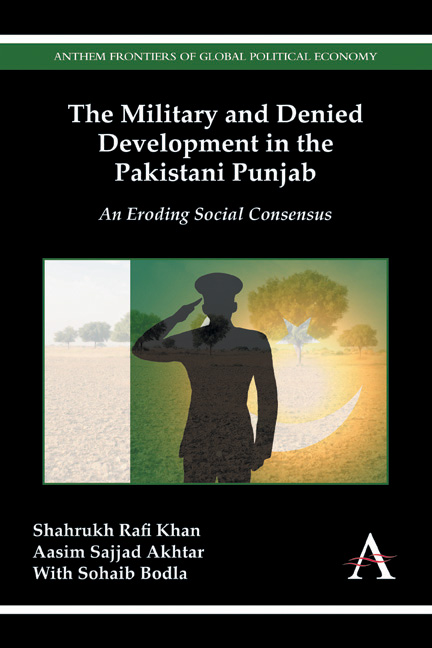Book contents
- Frontmatter
- Dedication
- CONTENTS
- Acknowledgments
- Abbreviations
- Preface
- Chapter One The Military and Economic Development in Pakistan
- Chapter Two Punjab's State–Society Consensus on the Military's Dominance and Economic Role
- Chapter Three Research Design, Method, Institutional Issues and Scope of the Military's Land Acquisitions
- Chapter Four The Military's Agrarian Land Acquisitions: High Handedness and Social Resentment
- Chapter Five From Social Resentment to Social Resistance
- Chapter Six Bahria Town: A Military-Related Real Estate Venture
- Chapter Seven The Military as Landlord in the Pakistani Punjab: Case Study of the Okara Farms
- Chapter Eight Guardians No More? The Breakdown of the Consensus
- Glossary
- Index
Preface
Published online by Cambridge University Press: 05 December 2014
- Frontmatter
- Dedication
- CONTENTS
- Acknowledgments
- Abbreviations
- Preface
- Chapter One The Military and Economic Development in Pakistan
- Chapter Two Punjab's State–Society Consensus on the Military's Dominance and Economic Role
- Chapter Three Research Design, Method, Institutional Issues and Scope of the Military's Land Acquisitions
- Chapter Four The Military's Agrarian Land Acquisitions: High Handedness and Social Resentment
- Chapter Five From Social Resentment to Social Resistance
- Chapter Six Bahria Town: A Military-Related Real Estate Venture
- Chapter Seven The Military as Landlord in the Pakistani Punjab: Case Study of the Okara Farms
- Chapter Eight Guardians No More? The Breakdown of the Consensus
- Glossary
- Index
Summary
My father was asked by a friend of his, Brigadier Ismael, if he would like to enter his name into a military General Headquarters (GHQ) lottery for a border-land distribution scheme, which was developed by Pakistan's first military dictator, Field Marshal Ayub Khan. The idea, I was told, was to give land near the Indian border to military personnel who would have the capacity to be “first responders” – or fighting men familiar with weapons and likely to have them on hand near the border – in case of enemy military action. This allocation would include noncommissioned soldiers and officers with allocation varying by seniority.
My father did not bother following up on his friend's suggestion, but Brigadier Ismael entered his name on the list anyway. My father won the lottery; his friend did not. Brigadier Ismael was later allocated land in District Sialkot, another border region. Several years passed and my father was alerted several times by GHQ to take possession of the land, but he declined to do so. Finally, he was informed by General Yahya Khan, the then army chief of general staff (later Pakistan's second military dictator with a brief tenure), to take possession or lose the land. My mother finally persuaded my father to do so, saying that his sons might one day benefit from the land. My father put half the land in my elder brother's name and half in mine.
This piece of land, roughly 60 acres, in Kasur near Mann village, three miles from the Indian border, became state property when Sikh refugees left for India. Much of the land in the area had belonged to Ranjit Singh Mann. When my father first visited it with Captain Sadiq, the assistant quarter master general, it was banjar (or wasteland), with sand dunes, reeds and shrubs that did not seem to offer any potential for agriculture. Worst still, the two squares (murabbas) that were allocated to him were in bits and pieces all over the place. My father decided to take on the challenge, and his brother-in-law, Khalid Iqbal, later to be one of Pakistan's pre-eminent landscape artists, agreed to help him with the land consolidation.
- Type
- Chapter
- Information
- The Military and Denied Development in the Pakistani PunjabAn Eroding Social Consensus, pp. xiii - xxviiiPublisher: Anthem PressPrint publication year: 2014



